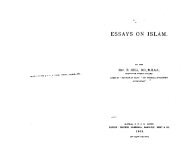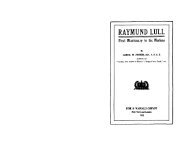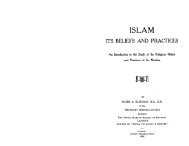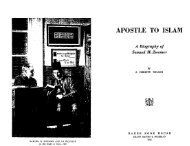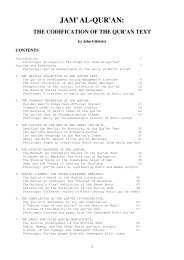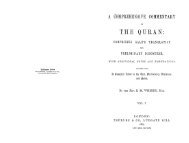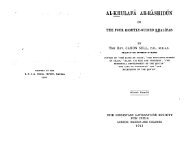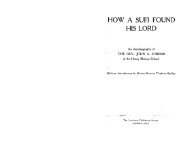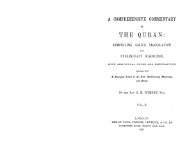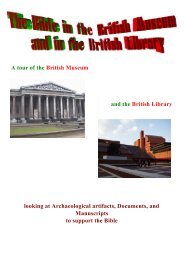Guillaume--Life of Muhammad.pdf - Radical Truth
Guillaume--Life of Muhammad.pdf - Radical Truth
Guillaume--Life of Muhammad.pdf - Radical Truth
You also want an ePaper? Increase the reach of your titles
YUMPU automatically turns print PDFs into web optimized ePapers that Google loves.
XVI<br />
The <strong>Life</strong> <strong>of</strong> <strong>Muhammad</strong><br />
<strong>Muhammad</strong> b. Muslim ... b. Shihab al-Zuhri (5'-'24) was a member <strong>of</strong><br />
a distinguished Meccan family. He attached himself to 'Abdu'l-Malik,<br />
Hisham, and Yazid, and wrote down some traditions for his princely<br />
pupils. He was the forerunner <strong>of</strong> the later traditionists in that he took<br />
extraordinary pains to interrogate people, young and old <strong>of</strong> both sexes, who<br />
might possess knowledge <strong>of</strong> the past. He left a history <strong>of</strong> his own family<br />
and a book <strong>of</strong> maghazi. Most <strong>of</strong> his traditional lore survived in the notes<br />
<strong>of</strong> his lectures that his pupils wrote down quoting his authority for the<br />
traditions they record. He spent some years in Medina as a young man.<br />
1.1. met him when he came south on pilgrimage and he is <strong>of</strong>ten named as an<br />
authority in the Sira. He was the most important traditionist .<strong>of</strong> his<br />
generation, and his influence is to be seen in all collections <strong>of</strong> canonical<br />
hadith. (See further J. Horovitz, Islamic Culture, ii. 33 ff.)<br />
'Abdullah b. Abu Bakr b. <strong>Muhammad</strong> b. 'Amr b. !;Iazm (d. 130 or 135)<br />
was one <strong>of</strong> I.I.'s most important informants. His father had been ordered<br />
by 'Umar b. 'Abdu'l-'Aziz to write a collection <strong>of</strong> prophetic hadith,<br />
especially what 'Amra d. 'Abdu'I-RaJ:tman said. This latter was a friend<br />
<strong>of</strong> 'Nisha and she was the aunt <strong>of</strong>this Abu Bakr. Already in the time <strong>of</strong> his<br />
son 'Abdullah these writings had been lost. Though we have no record <strong>of</strong><br />
a book by 'Abdullah, its substance probably once existed in the maghazi<strong>of</strong><br />
his nephew 'Abdu'I-Malik. As one would expect, the isnad is a matter <strong>of</strong><br />
indifference to 'Abdullah: he stood too near the events among many who<br />
knew <strong>of</strong> them to need to cite his authorities. Tab. (i. 1837) contains an<br />
interesting note on how 1.1. got his information. 'Abdullah told his wife<br />
Fatima to tell him what he knew on 'Amra's authority.<br />
Abii'l-Aswad <strong>Muhammad</strong> b. 'Abdu'I-RaJ:tman b. Naufal (d. 131 or<br />
137) left a maghazi book which sticks closely to 'Urwa's tradition.'<br />
Contemporal')" with our author in the third generation was Musa b.<br />
'Uqba (c. 55-'4'), a freedman <strong>of</strong> the family <strong>of</strong> al-Zubayr. A fragment <strong>of</strong><br />
his work has survived and was published by Sachau in '904.' As it once<br />
rivalled I.I.'s work and is ooe <strong>of</strong> our earliest witnesses to the Sira I have<br />
given a translation <strong>of</strong> the extant traditions. 3 Although Malik b. Anas,<br />
al-Shafi'i, and AJ:tmad b. !;Ianbal-an impressive. trio-asserted that his<br />
book was the most important and trustworthy <strong>of</strong> all, posterity evidently<br />
did not share their opinion or more <strong>of</strong> his work would have survived. 4<br />
I.I. never mentions him. One cannot escape the conviction that petty<br />
pr<strong>of</strong>essional jealousy was as rife in those days as now, and that scholars<br />
deliberately refrained from giving their predecessors credit for their<br />
achievements. Musa leaned heavily on al-·ZuhrI. He seems to have carried<br />
farther the process <strong>of</strong> idealizing the prophet.' He is freely quoted by<br />
al-Waqidi, I. Sa'd, al-Baladhuri, Tabari, and I. Sayyidu'I-Nas. He gave<br />
I See Hick, II. 2 S.RB.A. xi.<br />
3 f).i. where some doubts about the authenticity <strong>of</strong> some <strong>of</strong> them are raised.<br />
-4 Goldziher, M.S. ii. Z07, shows that it was in circulation as late as the end <strong>of</strong> the 9th<br />
century A.H. 5 Flick, u.<br />
lists <strong>of</strong> those who went to Abyssinia and fought at Badr. The latter<br />
Malik regarded as authoritative. He generally gives an isnad, though it is<br />
not always clear wh~ther he is relying on a written or an oral source. Once<br />
at least he refers to a mass <strong>of</strong> records left by Ibn 'Abbiis (I.S. v. 216).<br />
Occasionally he quotes poems.<br />
Ap~rt from the fragment <strong>of</strong> Wahb b. Munabbih's maghiizi the Berlin<br />
MS., If It IS authentIC, IS the oldest piece <strong>of</strong>historical literature in Arabic in<br />
existence., an~ if only for that reason deserves more than a passing notice<br />
here. It IS <strong>of</strong> Importance also because it carries back some <strong>of</strong> the traditions<br />
in Bukhiiri (d. 256) more than a century.<br />
~ther maghtizi works were produced in Iraq, Syria, and the Yaman<br />
dunng the second century, but none <strong>of</strong> them is likely to have influenced<br />
1.1. and they can safely be disregarded.' What is <strong>of</strong> significance is the<br />
gr~at interest in the life <strong>of</strong> the prophet that was shown everywhere during<br />
thIS century: But no book known to the Arabs or to us can compare in<br />
co~prehenslveness, arrangement, or systematic treatment, with I.I.'s work<br />
whIch will now be discussed.<br />
The Sira<br />
IntrodUl:tion<br />
The ,titles The Book <strong>of</strong> Campaigns or The Book oj Campaigns and (the<br />
prophet!) BIOgraphy or The Book ojthe Biography and the Beginning and the<br />
Campazgns 2<br />
are -all to be met with in the citations <strong>of</strong> Arabic authors.<br />
AI-Bolla'i, a pupil <strong>of</strong>1.1., made two copies <strong>of</strong> the whole book, one <strong>of</strong> which<br />
must ?ave reached I.H. (d. 218) whose text, abbreviated, annotated, and<br />
sometimes altered, is the main source <strong>of</strong> our knowledge <strong>of</strong> the original<br />
w~rk: A good deal more <strong>of</strong> it can be recovered from other sources.3 The<br />
prmclples underlying 1.H.'s revision are set out in his Introduction<br />
Sachau' suggests that the copy used by To was made when 1.1. was in Ra;<br />
by Sala:"a b. Fa



